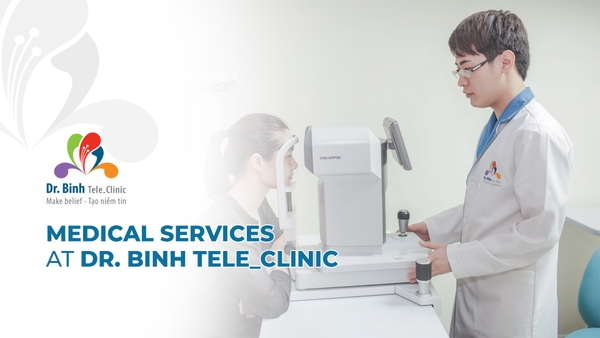EARLY RECOGNITION FOR TIMELY TREATMENT OF UTERINE FIBROIDS
- Dr.Binh Tele_Clinic offers up to 30% off on endoscopy with anesthesia combos
- Special Offers at Dr.Binh Tele_Clinic on Vietnamese Women’s Day
- Dangerous complications of cerebral infarction
- What to know when treating urinary stones?
03/08/2022
-0 Bình luận
Uterine fibroids, also known as leiomyomas, are a common gynecological disease in women. This is a common tumor in or around the uterus. Although not a complicated disease, if not treated in time, uterine fibroids will also bring dangerous complications to women's health.
So how do recognize and treat uterine fibroids promptly?

1. Overview of uterine fibroids?
Women between the ages of 35 and 50 are the most susceptible to developing uterine fibroids. Uterine fibroids are the most common type of tumor in the uterus, especially in overweight or obese women. According to research, women who have not given birth can also develop uterine fibroids.
Uterine fibroids are a benign disease composed of smooth muscle cells and fibrous connective tissue in the uterus.

It is estimated that about 70-80% of women will develop fibroids in their lifetime, and the fibroids will grow larger over time. Usually, when diagnosing a patient with uterine fibroids, doctors will be interested in the location, size, and a number of tumors in the uterus and the patient's accompanying symptoms.
In some women who enter perimenopause, the size of the tumor tends to shrink, but if the lumps are abnormally large, this may be a sign of malignancy.
2. What are the types of uterine fibroids?
The classification of fibroid tumor types will maximize the treatment of this disease. Here are some types of uterine fibroids:
- Subserosal fibroids: This is the most common form in patients with uterine fibroids. Tumors that grow from the myometrium to the outside of the uterus, have masses and stalks, cause torsion, and may cause necrosis;
- Fibroids in the uterine muscle: This is a type of tumor that also grows in the muscle of the uterus, causing the uterus to increase abnormally in size;
- Submucosal fibroids: This is the rarest form of fibroids. In the direction of growth of this type instead of going outside the uterus, the tumors go back into the uterus, lining up. Over time, these tumors grow to occupy the entire uterine cavity. In some cases, submucosal fibroids may have stalks, protrude, and cause infection.
3. What are the signs and causes of uterine fibroids?
Most cases of uterine fibroids have no symptoms or obvious symptoms that make the patient undetectable without going to the doctor. Some cases are discovered by chance that they have uterine fibroids during a gynecological examination or an ultrasound.

However, we can still monitor some abnormal signs on the body such as:
- Irregular menstrual cycle: Menstrual irregularities (too short or too long), or the appearance of large blood clots or abnormal bleeding are all early warning symptoms of uterine fibroids;
- Sudden pain in the lower abdomen: When tumors form and begin to increase in size, they will press on the abdomen, causing people to have lower abdominal pain like menstrual pain. The pain may be long-lasting or sometimes just a sudden pain;
- Abnormal vaginal discharge with a lot of odor is a warning symptom of uterine fibroids. Sometimes this symptom is often confused with other diseases or ignored;
- Frequent urination, thick frequency: The tumors that appear and gradually become larger will press on the bladder, causing the patient to urinate more than a normal person;
- Constipation: The mass that appears more or bigger and will press on parts of the digestive system causing the digestive function to decline, from which the patient will experience problems such as flatulence, constipation...
- Pain, bleeding after sex, or difficulty getting pregnant: If you feel unexplained pain after sex, you should be alert because this is a symptom of uterine fibroids. Or the patient has difficulty conceiving despite having no history of infertility or ovarian disease.
So what causes uterine fibroids to form?
Currently, medical science has not determined the cause of uterine fibroids. According to research, uterine fibroids are formed due to hormonal problems of estrogen and progesterone through epithelial growth factors or genetic theory when chromosomal disorders are found in the tumor.
Besides hormonal factors, other factors are thought to increase the risk of uterine fibroids such as sudden weight gain and loss, patients with a history of cervicitis and uterine inflammation, stress prolonged straight, unhealthy sexual activities, or sex too early…

Although uterine fibroids are not a malignancy, if not treated promptly, their large size will lead to complications and become a malignancy, directly affecting the mother's ability to become a mother female.
4. Dangerous complications from being subjective in the treatment of uterine fibroids
Treatment for uterine fibroids depends largely on factors such as age, tumor size, and accompanying symptoms. With small tumors, patients only need to be followed up every 6 months to 1 year. The case is indicated for treatment when the patient has a too large tumor that presses on other parts of the body, causing bleeding or miscarriage. Currently, the common treatment methods for uterine fibroids are medical treatment, minimally invasive intervention, and surgery.

When suffering from uterine fibroids, patients should not be too worried but also not be subjective because this disease can lead to the following complications:
For non-pregnant women
- Uterine fibroids cause anemia and compress surrounding organs: The larger the size of the fibroids, the higher the degree of compression. From there, the patient will experience abnormal bleeding leading to anemia; pale skin tone, less rosy; often tired. When being compressed by tumors, patients are often accompanied by symptoms such as urinary frequency, kidney stones, constipation, or lower extremity edema.
- The next dangerous complication of patients with uterine fibroids is torsion of the subperitoneal tumor. Initially, the patient presented with abnormal right iliac fossa pain accompanied by signs of nausea, bowel obstruction, dizziness, or fainting due to too much pain. This case needs to be treated promptly to avoid turning into peritonitis, which is more serious than death.
- Signs of infection in the form of polyps. The patient has symptoms such as abdominal pain, fever, increased white blood cell count, and dark brown mass with signs of necrosis when tested. This condition can lead to 2 forms of inflammation such as endometritis and inflammation of the fallopian tubes.
For pregnant and postpartum women
For pregnant women with fibroids, fetal growth will be affected, possibly slow or no growth, increasing the likelihood of a cesarean section compared to women without fibroids.
In addition, uterine fibroids also affect the movement of the fetal position because the uterine cavity is compressed, causing deformation, and preventing the fetus from turning to the right side to give birth according to the mother's vagina.
Not only affect the fetus, but uterine fibroids also cause placental abruption and difficult labor. Fibroids disturb the contraction of the smooth muscle of the uterus, obstructing the outflow of the fetus. Patients also need to be aware that the postpartum period can cause retained placenta if they have uterine fibroids.
Because this is a disease with no clear cause, it is difficult to give the best method to prevent uterine fibroids. Therefore, to protect our health, we should follow a healthy lifestyle to maintain a stable weight and have regular checkups to monitor our health status, especially women after 35 years old.
Please contact Dr. Binh Tele_Clinic to consult uterine screening packages or consult a doctor if the body has abnormal symptoms.
CS1: DR. BINH TELE_CLINIC
No. 11-13-15 Tran Xuan Soan, Pham Dinh Ho Ward, Hai Ba Trung District, Hanoi
Hotline: 19009204
Email: info@drbinh.com – Website: www.drbinh.com
Facebook: fb.com/biquyetchamsocsuckhoe
CS2: 365 MEDIHOME THANH LONG CLINIC
1st floor, Executive Building, Thang Long Industrial Park, Dong Anh, Hanoi
Hotline: 19009204
Website: thanglong.365medihome.com.vn/
Facebook: fb.com/365medihome




















Bình luận của bạn